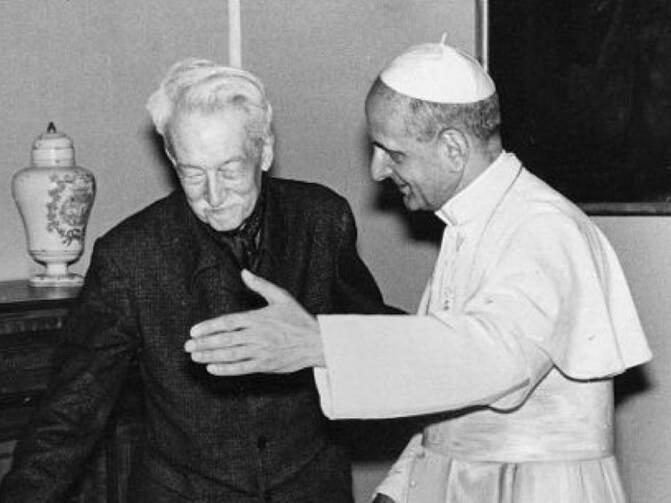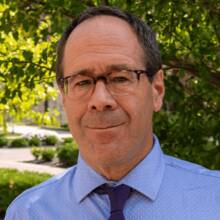Last year marked 50 years since the death of the French Catholic philosopher Jacques Maritain and almost 60 years since the promulgation of “Nostra Aetate,” the Catholic Church’s declaration at the Second Vatican Council on its relationship with non-Christian religions. As we are witnessing an explosion of antisemitism in our time, I want to tell the intertwined stories of Maritain and this shortest of Vatican II’s documents, now in its sixth decade as a milestone in Catholic-Jewish relations. In so doing, I hope to underscore the need for Christians, now more than ever, to repudiate and combat antisemitism.
In 1990, Pope John Paul II, commemorating the 25th anniversary of “Nostra Aetate,” affirmed that Christian self-understanding is predicated on acknowledging and respecting Jews as a covenantal people: “The Church is fully aware that Sacred Scripture bears witness that the Jewish people, this community of faith and custodian of a tradition thousands of years old, is an intimate part of the ‘mystery’ of revelation and of salvation.” He credited a handful of pre-Vatican II “Catholic writers” with this insight, including Thomas Merton and Jacques Maritain.
An ugly start
Maritain is often cited as a bright spot in the church’s otherwise problematic history of relating to Jews and Judaism. In 1997, the French Catholic bishops issued a Declaration of Repentance at Drancy, site of the camp known as “France’s antechamber to Auschwitz”:
In the context of the debate which we know took place, why did the Church not listen to its best voices? On several occasions before the war, through articles and public lectures, Jacques Maritain endeavored to open Christians to another perspective on the Jewish people. He also forcefully warned about the perversity of the antisemitism which was developing.
The bishops lamented their predecessors’ unwavering support for the collaborationist Vichy regime, which cooperated with the Nazis in the Holocaust, and which Maritain had vehemently opposed. Maritain also helped inspire the French Resistance with his wartime writings and radio addresses.
But Maritain had not always stood on the side of the angels. He had converted to Catholicism in the first decade of the 20th century, when France found itself roiled by the Dreyfus Affair, the bitter separation of church and state and endless political squabbles that only partially subsided during World War I. By the 20s, this philosophy professor found himself drawn to the ultra-nationalist rhetoric of Action Française, an authoritarian and xenophobic movement that seduced many French Catholics with its promise to return the country to unity, tradition and order. Though married to a Russian-Jewish convert, Maritain lent his pen not only to antimodern diatribes, but also an essential equation of modernity’s ills with Jews:
It is necessary to add that an essentially messianic people such as the Jews, from the instant when they reject the true Messiah, inevitably will play a subversive role in the world… Jews, Jewish intrigues, and the Jewish spirit can be found at the origin of most revolutionary movements in the modern era.
In the late 1920s, a papal condemnation of Action Française and its leader Charles Maurras meant that Maritain had to choose between fidelity to the church and his flirtation with proto-fascist doctrines. Pope Pius XI directed the philosopher to draft a defense of the papal ban. Maritain obeyed the pontiff, burning his bridges with the extreme right and rethinking his political theology.
‘An apocalyptic period’
Indeed, by the second half of the 1930s, Maritain solidified his reputation not only as a leading Catholic intellectual but also as an anti-fascist proponent of pluralism and human rights. His influential book Integral Humanism highlighted these characteristics of a “new Christendom” against the backdrop of the rise of Nazism and, for Catholics, the bloody, divisive spectacle of the Spanish Civil War. As for his attitude toward Jews, he now thought it logically and morally impossible for a Christian to embrace antisemitism given what he saw as the providential role of the Jewish people:
Whereas the Church is assigned the task of the supernatural and supratemporal saving of the world, to Israel is assigned, in the order of temporal history and its own finalities, the work of the earthly leavening of the world… it teaches the world to be dissatisfied and restless so long as it has not God, it stimulates the movement of history.
Maritain still saw the Jews as agents of ferment but had sanctified his thesis: “Race, People, Tribe, all these words used to describe them must be sacralized.” Sacralization, i.e. treating something or someone as holy, entails mystery. And sometimes it can provoke hostility. More than one observer on the far right equated this kind of philosemitism with treason. The French fascist writer Lucien Rebatet let the venom drip freely: “Monsieur Jacques Maritain is married to a Jewess. He has Jew-ified his life—his doctrine and his theology are falsified like the passport of a Jewish spy.”
In the late 1930s, a general European war appeared ever more likely. Maritain sensed that the conflict would unleash a war of annihilation against the Jews. In a public lecture in 1938, he said:
In order to fan the evil fire that consumes peoples, there are in the Europe of today, those who want extermination and death, and first and foremost the extermination of the Jews—because that really is what it comes down to, doesn’t it? ...the insane hope for a general massacre of the race of Moses and Jesus.
Not only did the philosopher prophesy the destruction of European Jewry, but he also saw the Second World War in almost biblical terms, asserting in 1939 that “[n]ever before in the history of the world were the Jews persecuted so universally; and never has persecution attacked as today, both Jews and Christians. We can see here that we have entered upon an apocalyptic period in history.” The events of 1940 further convinced him that “[w]e have entered into the country of the Apocalypse and of great sufferings.”
Subverting hatred
Maritain spent the wartime years in exile in New York, along with his wife Raïssa and her sister Vera. Reports of mounting Nazi atrocities struck him as tantamount to a new crucifixion, this time of both Jesus and millions of Jesus’ fellow Jews: “Jesus Christ suffers in the passion of Israel,” he wrote. “In striking Israel, the anti-Semites strike him, insult him and spit on him. To persecute the house of Israel is to persecute Christ.” Maritain’s embrace of the Pauline theology of the “mystery of Israel” led him to view suffering Jews, whom he called Christ’s “forgetful people,” as participants in the economy of salvation. Yet he avoided a triumphalist equation of mass murder with mass conversion. In fact, this Catholic’s vision of a “passion of Israel” also drew on Jewish sources.
These included Maurice Samuel’s 1940 book The Great Hatred, which identified “Christophobia” as the driving force of racist antisemitism, as well as the paintings of Maritain’s dear friend Marc Chagall, who portrayed the Jewish Jesus suffering with his persecuted people.
Maritain’s response to the “sacred horror” of the Holocaust led him not only to oppose racist antisemitism but also to rethink his church’s teachings vis à vis Jews and Judaism. As mentor to the Rev. John Oesterreicher, a convert from Judaism who later served as a principal drafter of “Nostra Aetate,” Maritain admonished the latter to avoid recourse to anti-Jewish tropes in his exegesis:
The Acts, Saint John, and Saint Paul all speak of ‘the Jews’… because they were thinking primarily of the rejection of Christ by Israel as a mystical body, and subsequently characterized Jews in opposition to Christians (who were themselves largely Jews in the beginning)… For those of us who do not speak in an inspired language, but that of human and historical narration, I think that we must take care not to speak of ‘the Jews’ in such a case, but of such and such Jews.
In short, Maritain sought to subvert the kind of anti-Jewish suppositions within the church that his contemporary, the French Jewish historian Jules Isaac later called “the teaching of contempt.”
This toxic conglomeration of accumulated Christian prejudices not only identified Jews as stubborn, “stiff-necked” deniers of Christ and followers of a dead, superseded religion, but also saw in them a reprobate race guilty of deicide: Christ-killers. In a 1944 article for the American Zionist journal Jewish Frontier, Maritain attacked this last prejudice head-on:
Who killed Christ? The Jews? The Romans? I have killed Him, I am killing Him every day through my sins. There is no other Christian answer, since He died voluntarily for my sins, and to exhaust the justice of God upon Himself. Jews, Romans, executioners, all were but instruments, free and pitiable instruments, of His will to redemption and sacrifice. That is what Christian teachers ought to inculcate in their pupils.
Historians might identify this kind of statement as revolutionary, but it also reiterates what the church had taught in some of its better moments—for example, the 1566 Catechism of the Council of Trent: “This guilt seems more enormous in us than in the Jews, since according to the testimony of the same Apostle: If they had known it, they would never have crucified the Lord of glory; while we, on the contrary, professing to know Him, yet denying Him by our actions, seem in some sort to lay violent hands on him.” One is reminded here that in some respects, “Nostra Aetate,” like other Vatican II documents, achieved progress by returning to the authentic sources of Christian belief.
Eschatalogical hope
After the war, Maritain served as French ambassador to the Holy See, where he lobbied Pope Pius XII for a definitive condemnation of antisemitism on behalf of the church. He confided his fears and hopes to papal undersecretary Giovanni Battista Montini, the future Pope Paul VI, insisting that the fall of Nazism did not entail the demise of antisemitism:
The antisemitic psychosis has not vanished… I cannot stop myself from thinking that a proclamation of the true thought of the Church would be simultaneously a work of enlightenment striking down a cruel and harmful error as well as a work of justice and reparation.
A 1947 papal audience only left Maritain with a “heart-rending ambivalence” regarding Pope Pius XII, a pontiff who believed that he had already adequately addressed this matter.
As we know, Pius XII’s successor, Pope John XXIII, would revisit the question of Catholic-Jewish relations at Vatican II, largely at the urging of the aforementioned Jules Isaac. When Pope John died during the Council, Pius’s old undersecretary Montini, who had long considered Maritain his “teacher,” became Pope Paul VI.
Maritain, now retired from the philosophy faculty at Princeton University and living in a French monastic community, was summoned to Rome for the joyous close of the Council. Despite the honor, Maritain privately bemoaned what he saw as a watering-down of “Nostra Aetate,” which had undergone several drafts after attracting much theological and political controversy: “I have suffered a real wound in seeing that the words ‘and condemns’ after the word ‘decries’ (hatred, persecution, manifestations of antisemitism) have been suppressed,” he wrote to a friend in 1965.
For Maritain, “Nostra Aetate” was an overdue but not complete repudiation of antisemitism by the church. Arguably, he would have appreciated the further steps taken by the church in decades to come, particularly during the momentous papacy of John Paul II. And he must have understood that this document constituted a momentous achievement, not just in historical time but also in the light of Providence. For Maritain possessed something greater than ecumenical tolerance: he had eschatological hope.
With that in mind, I will let Maritain have the last word: “God is patient. He does not charge the Jewish people with what Christians call their obstinacy, and which Jews call their fidelity… Who would venture to say that in him love gave way to the thirst for vengeance and reprobation? This would be blasphemy.”








